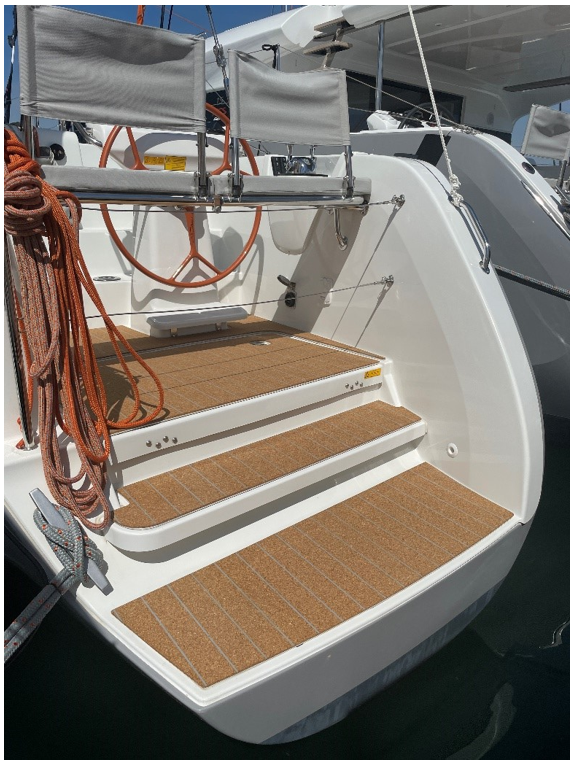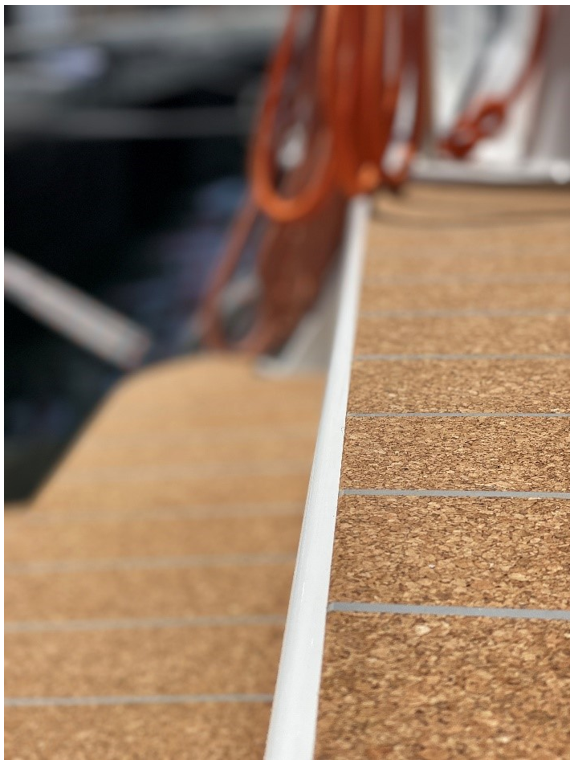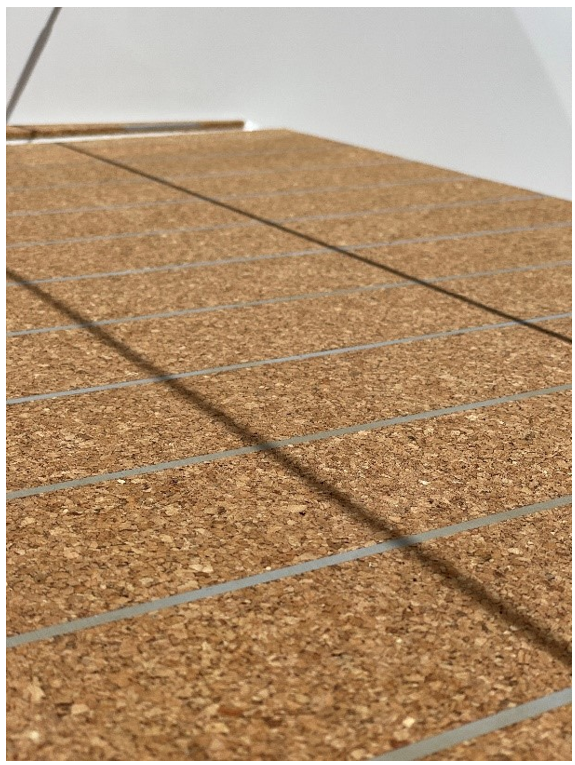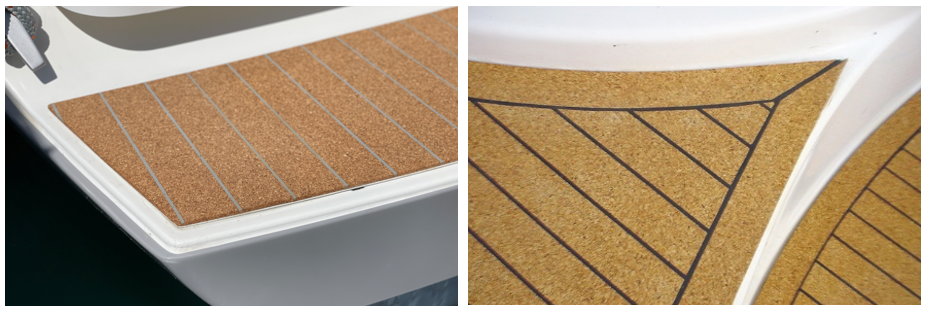The cork decking
The subject of deck coverings is an area where many alternatives have flourished in recent years: synthetic deck covering, iroko, adhesive foam, etc.
In our search for ecological and sustainable solutions for the Excess catamarans range, and after testing a prototype of a hybrid diesel-electric drivetrain aboard an Excess 15 (see our articles on the subject in the E’Lab), we decided to go with the opinion of the greatest number of people - cork decking.
At the International Multihull Show, we exhibited an Excess 12 that featured a sugarscoop fitted with SEACORK decking. We’re interested to hear your feedback on this technology.

Cork is an ecologically responsible product. Its longevity is an important asset to reduce excessive consumption, but it is also a solution involving local production, thus avoiding lengthy transport problems. It comes from the bark of trees grown on the shores of the Western Mediterranean and processed in France not far from our shipyards. Cork Oak bark is harvested every 9 years and is naturally renewed without the need to cut down the tree. A single tree can provide 10 to 12 harvests, while absorbing large amounts of CO2, which makes it a sustainable development material par excellence.
But let’s take a look at the great advantages of a cork deck, of which there are many for us boaters.

First of all, it is an excellent non-slip material. Its micro-abrasive texture and its flexibility promote adherence and safety in all circumstances, even when covered with water.
Comfort, above and below decks, is its second great quality. It won’t burn your feet in the sun, and it cushions your body weight as you move around for a comfortable ride on deck. Its softness and suppleness allow you to be on your knees or to sit down in comfort. Down below, its acoustic and thermal insulation qualities reduce noise and temperature. Footsteps or falling objects no longer wake those off watch. The inside temperature on board decreases in the areas under the parts covered with cork.
Aesthetically, like other natural decking materials, it turns gray over time, and a simple sanding can restore it to its original brown color. Impervious to watery and greasy liquids, it will resist the most tenacious of stains. It is rot-proof, so maintenance is easy, and it has a very long life.
On the technical side, its compressibility and elasticity, with total resilience, make it a material that’s perfectly suited to the maritime environment – one that can cause other deck covering materials to expand, shrink or puncture. Half the weight of teak or some synthetic coverings, it contributes to weight savings and maintaining good performance.
For safety, its high self-extinguishing resistance allows to delay fire. Anti-conductive, it is an excellent electrical insulator in the event of a lightning strike. And from a sanitary viewpoint, its natural anti-viral, anti-microbial and anti-static properties offer an undeniable plus, especially when sailing in tropical regions.
Cork does however have some disadvantages. First, it has a different aesthetic than traditional woods, and so might be perceived as less noble. Although locally grown, it also remains an expensive product and it isn’t cheaper than exotic woods. Finally, its great capacity of expansion, before gluing, makes it a more difficult material to manage during its installation.
User reaction
In order to carry out a proper test at the show at La Grande-Motte, we placed 70-millimeter-wide strips, without a surround, with gray caulking in the seams, on an Excess 12 and asked our dealers to give us feedback. About 70% of the boaters found the cork convincing, but it's worth noting that those who stepped on it were far more enthusiastic than those who only looked at it.

The questions we’re asking:
There are several different designs of cork decking. We'd like to know your preferences for the features below.
Would you prefer a more conventional 44-millimeter-wide strips, or a 70-millimeter-wide strip as shown above?

We have used gray caulking on the Excess 12, but would you prefer black caulking?

In your opinion, is it better to have deck planks with or without a surround?
More generally, do you feel that cork is a solution in line with the Excess DNA?
One final question, and it’s far from the least important! Would you buy a boat with cork decking?
We thank you in advance for your answers in the comments and are looking forward to discussing this topic with you.




Jean-Albert
A big thank you to @Geronimo, @BoLorentzen, @Lil__yachtie @Atheo and @Franciscoxpl for your participation and involvement - we can see that our contributors understand the Excess DNA, it's great! We're making progress thanks to you! Also, thanks to @Guillaume, Excess staff member for his contribution!
Claire
Unfortunately it is not possible to buy the material from us at the moment. I am sending you an email with the contact details of our supplier, the best thing to do is to write to him to check directly with him.
Thank you very much!
Claire
I reckon the 44mm with grey caulking looks more refined and I believe a surround would finish it well.
Using cork as an insulator to noise and heat is useful about cork but a large volume of cork would be needed to effectively insulate - insulation is however and issue that should be looked into more as many boats (generally after a certain number of years) become noisy, excessively hot/cold and often damp in colder climates.
In summary, cork decking is a unique concept for those who seek an alternative decking material than fibreglass and provides a sustainable image to the excess brand.
Probably a valid Excess upgrade option -
But personally I would likely spend the weight on something else..
Et tout d'abord encore merci de cette bonne idée: personnellement je suis d'accord avec la plupart des avantages / inconvénients listés dans le post en tout cas pour ceux que je connais et/ou imagine. Forcément je valide la démarche produit naturel, démarche durable, cycle court, caractéristiques mécaniques d'isolation et de poids, antidérapant, et j'aime bien l'esthétique et les sensations sous les pieds. Je me demande quand même comment cela vieilli, comment concrètement le liège réagit aux grosses tâches grasses (j'ai bien lu le post, mais cette matière semble couverte d'aspérités, voire poreuse, comment se gère le bidon d'huile moteur ouvert qui se renverse ...), comment ça résiste au "poinçonnage" : on pose un wing sur le pont et la pointe agressive du foil vient taper le revêtement, l'ensemble bouteille de plongée / stab qui bascule à la faveur d'une vague ... ? Sinon je suis séduit par ce revêtement et je préfère perso les bandes les plus larges, grises et sans contours... Mais les goûts et les couleurs :-) : nous sommes 2 à répondre et déjà 2 avis différents.
Merci beaucoup pour votre contribution ! Concernant les tâches grasses, je transfère votre demande à notre fournisseur, on revient vers vous rapidement !
A très vite,
Claire
Voici la réponse de notre fournisseur Seacork concernant vos questionnements ci-dessus :
"Pour répondre à votre question sur les taches éventuelles de graisse, un simple nettoyage avec de l'eau de mer ou un dégraissant suffisant et un balai brosse dure comme on en a tous chez soi. Pour ce qui est du problème d'un éventuel impact normalement pas de problème non plus mais s'il y a déchirure on peut tout à fait s'inspirer de cette vidéo que j'ai réalisé pour aider les usagers à réparer eux même leur bateau : https://www.youtube.com/watch?v=MECeb_tm9xs"
Merci à Seacork pour leur retour ! @Enjoycatamaran, n'hésitez pas à revenir vers nous si vous avez d'autres questions.
A bientôt,
Claire